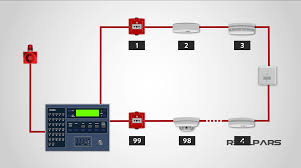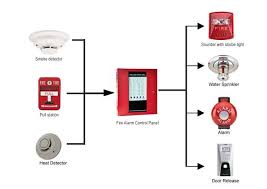FIRE DETECTION SYSTEM REQUIRED for Ships – Installation & Compliance
In the maritime industry, safety at sea is paramount. A reliable Fire Detection System is not just a regulatory requirement—it is a vital component of ship safety and onboard risk management. At SEANAV, we specialize in the supply, installation, maintenance, and calibration of marine fire detection systems that meet IMO and SOLAS standards. If you’re wondering whether a fire detection system is required for your vessel, the answer is a resounding yes—for both legal compliance and the protection of lives and cargo.
Why a Fire Detection System is Required on Ships
Ships operate in environments where fire hazards are numerous—from engine rooms to electrical panels and cargo holds. A fire detection system provides early warning, enabling the crew to take swift action. Compliance with the International Maritime Organization (IMO) and Safety of Life at Sea (SOLAS) conventions mandates the presence of these systems on commercial and passenger vessels.

SEANAV’s Marine Fire Detection Solutions
SEANAV offers a full suite of fire detection and alarm system services:
- Installation of marine-certified fire detection systems
- 24/7 onboard fire sensor calibration
- Maintenance and troubleshooting services
- Spare parts and system component supply
- Compliance audits for SOLAS/IMO certification
Types of Fire Detectors We Install
We support a variety of detector types, such as:
- Smoke Detectors
- Heat Detectors
- Flame Detectors
- Multi-sensor Detectors
FAQs: Fire Detection System Required
Here are the most commonly asked questions about marine fire detection systems:
- 1. Is a fire detection system mandatory on all ships?
- Yes, SOLAS mandates fire detection systems on most commercial and passenger vessels.
- 2. Who enforces the requirement for fire detection systems on vessels?
- The International Maritime Organization (IMO) sets the standards, enforced by flag states and classification societies.
- 3. Can SEANAV install systems that meet international standards?
- Absolutely. All our systems comply with SOLAS and IMO regulations.
- 4. How often should fire detection systems be inspected?
- Regular checks are recommended every 3-6 months, with annual inspections required for compliance.
- 5. What types of ships need these systems?
- Cargo vessels, oil tankers, cruise ships, container ships, and even offshore platforms.
- 6. Do fire detection systems require calibration?
- Yes. Sensors must be calibrated regularly to ensure reliability and compliance.
- 7. Does SEANAV provide emergency repair services?
- Yes, we offer 24/7 emergency repair and maintenance services for critical fire detection systems.
- 8. What happens if a ship lacks a fire detection system?
- Non-compliance can lead to detainment, penalties, or revocation of operational certification.
- 9. How long does installation usually take?
- Depending on the system, installation takes from one day to a week. We strive for minimal downtime.
- 10. Can we get remote support or diagnostics?
- Yes. Some systems support remote diagnostics, and SEANAV provides remote technical guidance.
- 11. Does SEANAV supply spare parts?
- Yes, we supply OEM and compatible spare parts for all major marine fire detection brands.

Contact SEANAV Today
Don’t wait until an incident happens. Ensure your vessel is compliant and protected. Contact SEANAV today for expert advice, installation, and support for your marine fire detection system needs. Your ship’s safety starts with proactive detection.

